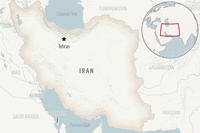A lethal chain of mistakes by U.S. air and ground forces in the "fog of war" led to the relentless AC-130U gunship attack on the Kunduz hospital that killed at least 42 last October, but the tragic errors did not rise to the level of war crimes or court-martial offenses, U.S. Central Command said Friday.
"They were trying to do the right thing," Army Gen. Joseph Votel, the CentCom commander, said of the U.S. Special Forces on the ground who called in the strike and the gunship crew, but a combination of human error and equipment failure resulted in their unleashing a 30-minute rain of cannon and gatling gun fire on the wrong target.
At a Pentagon briefing summing up the 3,000-page CentCom investigation of the Oct. 3 incident, Votel said "the personnel involved did not know they were striking a medical facility," although the coordinates of the Medicins Sans Frontiere (Doctors Without Borders) Trauma Center in Kunduz were given to U.S. commanders well before the attack.
MSF officials also frantically called and e-mailed U.S. commanders in Kabul and Washington pleading for the attack to be called off by the AC-130U "Spooky II" aircraft and its side-mounted .105mm and .40mm cannons.
After consulting with legal advisers, Votel said he had concluded that "the fact that this was unintentional -- the unintentional action takes it out of the realm of being considered a war crime" or a potential court-martial offense.
"The comprehensive investigation concluded that this tragic incident was caused by a combination of human errors, compounded by process and equipment failures," Votel said.
Votel also noted that the Special Forces team on the ground been fighting for five days in support of Afghan National Security Forces (ANSF) to repel Taliban fighters who had taken over north-central Kunduz -- the first time the Taliban had overrun a provincial Afghan capital. "This was an extreme situation we were dealing with," Votel said.
The investigation report said that "fatigue and high operational tempo also contributed to the incident. These factors contributed to the 'fog of war' which is the uncertainty often encountered during combat operations."
"The investigation found that this combination of factors caused both the ground force commander and the air crew to believe mistakenly that the air crew was firing on the intended target, an insurgent-controlled site approximately 400 meters away from the MSF Trauma Center," the CentCom report said.
Army Gen. John Campbell, the U.S. Forces-Afghanistan commander at the time, found in November that "certain personnel failed to comply with the rules of engagement and the law of armed conflict," but the CentCom investigation "did not conclude that these failures amounted to a war crime."
"The label 'war crime' is typically reserved for intentional acts" but "none of the personnel knew that they were striking a medical facility," the investigation said.
Votel said that a total of 16 members of the ground and air personnel, and others up the chain of command, including a general officer, had been singled out for discipline. He said the names of the 16 were being withheld for security reasons.
The general officer was believed to have been suspended and ordered out of Afghanistan. Six others were sent to counseling, seven were issued letters of reprimand, and two were ordered to retraining courses.
Votel said that the disciplinary measures "can carry severe repercussions on careers," including "denial of promotion, advancement and possible separation from service."
'Condolence' payments
President Obama last year apologized to the Afghan people for the attack and Votel said the U.S. has since made "condolence" payments totaling roughly $252,000 to the families of the 42 killed and the estimated 128 wounded -- $6,000 for those killed and $3,000 for those wounded. Votel also said the U.S. was prepared to devote $5.7 million to building a new hospital.
Votel added that "senior U.S. representatives have spoken with MSF officials, including the MSF executive director, over two dozen times to express condolences, explain how the tragic incident occurred, and outline future steps."
Campbell's successor, Gen. John Nicholson, met with families of the victims from the attack and issued a personal apology shortly after assuming command in March.
"I grieve with you for your loss and suffering; and humbly and respectfully ask for your forgiveness. We mourn the death of any Afghan, but the death and wounding of innocent Afghans because of our mistake is extremely painful to us," he said at the time.
In response to the investigation, MSF said "many questions remain outstanding seven months after the attack," and the humanitarian medical group renewed its call for an independent investigation by the International Humanitarian Fact Finding Commission.
The commission, set up in 1991 under the Additional Protocols of the Geneva Conventions, can investigate only when all parties involved agree to abide by its findings, and the U.S. has not agreed.
MSF officials said Votel had briefed them for two hours on Thursday on the results of the investigation, but they had not yet had time to review the full 3,000-page report.
However, the Pentagon briefing by Votel "amounts to an admission of an uncontrolled military operation in a densely populated urban area, during which U.S. forces failed to follow the basic laws of war," Meinie Nicolai, president of MSF Belgium, said in a statement. "It is incomprehensible that, under the circumstances described by the U.S., the attack was not called off."
The CentCom investigation was led by Army Maj. Gen. William Hickman, whose main assistants were Air Force Brig. Gen. Robert Armfield and Army Brig. Gen. Sean Jenkins. "All three generals were brought in from outside Afghanistan in order to provide an objective perspective," the investigation said. The generals were assisted by more than a dozen experts from specialty fields.
Inadequate preparation
The initial request for an airstrike on a Taliban-occupied building came from the ANSF and was supported by the Special Forces team on the ground, which included a JTAC, or Joint Terminal Attack Controller to guide the AC-130U, the investigation said.
The MSF Trauma Center was on a U.S. "no strike" list but, because of the urgency of the mission, the AC-130U took off 69 minutes earlier than planned and the crew did not have adequate preparation.
"While en route to Kunduz, one of the AC-130's critical communications systems failed, resulting in an inability to receive updates from and transmit information to multiple command headquarters," the investigation said.
Votel also said that while en route to Kunduz, the gunship came under fire from a shoulder-fired missile, forcing it to take evasive action that "degraded its ability to locate ground targets. These factors all contributed to the incident," the investigation said.
In his response to the investigation, Sen. John McCain, an Arizona Republican and chairman of the Senate Armed Services Committee, said, "Our nation cannot alleviate the grief and sorrow of those who lost loved ones in this unspeakable tragedy, but we can and must do everything in our power to fully understand what happened and why, hold those responsible to account, and learn the lessons of our failures to better protect innocent life in the future."
-- Richard Sisk can be reached at richard.sisk@military.com.





























